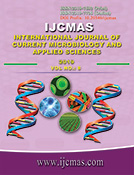


 National Academy of Agricultural Sciences (NAAS)
National Academy of Agricultural Sciences (NAAS)

|
PRINT ISSN : 2319-7692
Online ISSN : 2319-7706 Issues : 12 per year Publisher : Excellent Publishers Email : editorijcmas@gmail.com / submit@ijcmas.com Editor-in-chief: Dr.M.Prakash Index Copernicus ICV 2018: 95.39 NAAS RATING 2020: 5.38 |
Molecular genetic markers correspond to highly potent source for the study of plant genomes and the association of inherited phenotypic traits with underneath genetic variation. Single Nucleotide Polymorphism (SNPs) are most abundant form of molecular genetic marker which represents a single nucleotide difference between two individuals at a defined location. Compare to others SNPs are direct sequence variation which offers the precise nature of the allelic variants among different genotypes. Further, it signify recurrent type of genetic polymorphism with high density genome coverage. Advent of Next generation sequencing technology drives the exploration of sequence diversity for various crops. These studies revealed abundance of SNPs in plant systems, with the frequency of 100-300bp per SNP.SNP detection based on EST(expressed sequence tags) sequence data has been performed for crops like maize, barley, tomato and trees like pine and in Arabidopsis which is a model plant. Similarly SNP identification based on array analyses has been published for Arabidopsis, rice, barley and maize. Amplicon resequencing approach has been utilized for the identification of SNPs in maize, soybean, Arabidopsis, rice, tomato, sugarbeet, barley and spruce. There are two sets of data to perform SNP mining one is reference sequence data and other is de novo sequence data. This mining for various datasets mainly comprise of subsequent steps: in first step we have to group sequence reads on the basis of their sequence resemblance and confirm identity of reads whether they are covering similar part of genome or they have the same transcript origin. Further we have to align confirm reads and finally identify and categorize sequence variants as probable polymorphic loci/marker. Thus SNP mining can provide better understanding of crops at the gene level, for the detailed analysis of germplasm and eventually for the resourceful management of genetic diversity on a whole genome level inside plant breeding.
 |
 |
 |
 |
 |